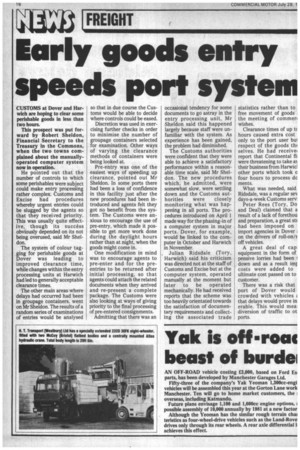Early goods entry speeds port system
Page 18

If you've noticed an error in this article please click here to report it so we can fix it.
CUSTOMS at Dover and Harwich are hoping to clear some perishable goods in less than two hours.
This prospect was put forward by Robert Sheldon, Financial Secretary to the Treasury in the Commons, when the two towns complained about the manuallyoperated computer system now in operation.
He pointed out that the number of controls to which some perishables were subject could make entry processing rather complex. Customs and Excise had procedures whereby urgent entries could be slugged by the agents so that they received priority. This was usually quite effective, though its success obviously depended on its not being overused, said Mr Sheldon.
The system of colour tagging for perishable goods at Dover was leading to improved clearance time, while changes within the entry processing units at Harwich had led to generally acceptable clearance times.
The other main areas where delays had occurred had been in groupage containers, went on Mr Sheldon. The results of a random series of examinations of entries would be analysed so that in due course the Customs would be able to decide where controls could be eased.
Discretion was used in exercising further checks in order to minimise the number of groupage containers selected for examination. Other ways of varying the clearance methods of containers were being looked at.
Pre-entry was one of the easiest ways of speeding up clearance, pointed out Mr Sheldon. In some ports there had been a loss of confidence in this facility just after the new procedures had been introduced and agents felt they got no benefit from the system. The Customs were anxious to encourage the use of pre-entry, which made it possible to get more work done during the daylight hours rather than at night, when the goods might come in.
One modification in mind was to encourage agents to pre-enter and for the preentries to be returned after initial processing, so that agents could attach the related documents when they arrived and re-present a complete package. The Customs were also looking at ways of giving priority to the final processing of pre-entered consignments.
Admitting that there was an occasional tendency for some documents to go astray in the entry processing unit, Mr Sheldon said this happened largely because staff were unfamiliar with the system. As experience has been gained, the problem had diminished.
The Customs authorities were confident that they were able to achieve a satisfactory performance within a reasonable time scale, said Mr Sheldon. The new procedures which, he admitted, were somewhat slow, were settling down and the Customs aut horities were closely monitoring what was happening in all ports. The procedures introduced on April I made way for the phasing-in of a computer system in major ports. Dover, for example, would be linked to the computer in October and Harwich in November.
Julian Ridsdale (Tory, Harwich) said his criticism was directed not at the staff of Customs and Excise but at the computer system, operated manually at the moment but later to be operated mechanically. He had received reports that the scheme was too heavily orientated towards the satisfaction of documentary requirements and collecting the associated trade statistics rather than to free movement of goods the meeting of commerl wishes.
Clearance times of up tc hours caused extra cost only to the port user bui respect of the goods th( selves. He had receive4 report that Continental fi, were threatening to take al, their business from Harwicl other ports which took o four hours to process dc ments.
What was needed, said Ridsdale, was a regular sev days-a-week Customs serv Peter Rees (Tory, Do and Deal) claimed that a result of a lack of forethou and preparation, a great str had been imposed on import agencies in Dover ; on the drivers of roll-on/r off vehicles.
A great deal of cap: equipment in the form of pensive lorries had been 1 down and as a result imr costs were added to ultimate cost passed on to customer.
There was a risk that port of Dover would crowded with vehicles that delays would prove in erable. This would meal diversion of traffic to ot ports.




























































































